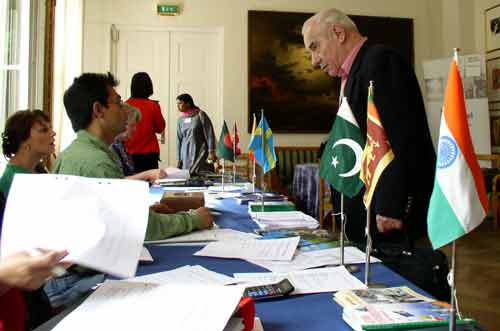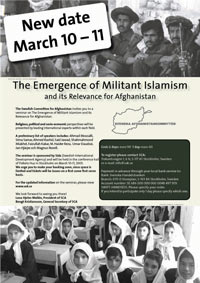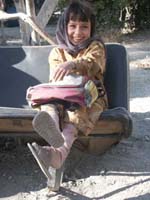SWEDISH
SOUTH ASIAN STUDIES NETWORK
 Newsletter
41: Newsletter
41:
15 July 2004
SASNET News:
• Success for the 18th ECMSAS conference
SASNET has successfully arranged the 18th European Conference
on Modern South Asian Studies in Lund 6–9 July 2004. With
356 participants from all over the World (final
and complete list of participants available as a pdf-file) –
including a large number of PhD candidates and participants from South
Asia itself – it was the largest ECMSAS conference so far, and certainly
the largest gathering ever on Swedish soil of South Asia oriented researchers,
covering all fields from the humanities and social sciences to technology,
natural sciences and medicine.
Coverage of the conference has been given in two regional newspapers,
and casual day-by-day reports by Behnoosh Payvar, Masters student of South
Asian Studies, Lund University, have all been published on the conference
web site.
Besides this the conference has specially assigned Dr. William Radice,
renowned Bengali Studies scholar and brilliant writer, to write an extensive
conference diary that will be be published on the web site within a day
or two.
Full updated information on the Lund conference.
• Full conference papers to be presented
on the web
A large number of full papers presented to the 44 conference
panels are already posted on the conference website, and more will follow
after the conference. They should be sent as Word-files to Lars Eklund.
See the complete list of the 44 conference panels,
with panel/paper abstracts and links to full papers.
• 26 applications for SASNET planning
grants 2004
Applications have been received for the first round of SASNET 2004 planning
grants for research and educational projects and programmes involving
Swedish researchers in collaboration with colleagues/institutions in South
Asia. Closing date for applications was 15 June 2004, and decisions will
be taken in the end of August. More information.
Community News:
 •
EASAS still to decide upon the location for its 19th ECMSAS conference •
EASAS still to decide upon the location for its 19th ECMSAS conference
The European Association for South Asian Studies (EASAS) is a professional,
non-profit organisation of scholars engaged in research and teaching concerning
South Asia with regard to all periods and fields of study. The objectives
of EASAS are to support and promote South Asian Studies in all countries
of Europe. SASNET organised the 18th ECMSAS conference in Lund on
behalf of EASAS. At the Lund conference’s concluding Business meeting
a discussion was held on which institution should host the next conference
in 2006. No decision could however be made, but suggested candidates
include universities in the Netherlands, France and United Kingdom. The
EASAS board will continue to negotiate and come out with a final decision
before 1 October 2004. Those who are still not members of EASAS but wish
to join may contact the EASAS secretariat and apply for such, through
the web page: http://213.207.98.217/index.php?q=node/74
Educational News
• Göteborg
University offers Basic Course in Peacework
The Dept. of Peace and Development Research, PADRIGU, Göteborg University,
offers a 20 credits Basic Course in Peacework during the Fall 2004, with
some emphasis on South Asia. The course is organised by Stellan Vinthagen.
More information.
• Educational programme in Göteborg
for practitioners in the Global Civil Society
The non-profit organisation Nätverkstan in Göteborg
offers a three semesters Global Workshop educational programme for practitioners
and managers in the global civil society (NOTE: Totally outside the
framework of Göteborg University). Participants (students) from
all over the World with an experience of non-governmental organisations;
human rights, development, culture and art, journalism (mainstream or
alternative), are invited to join the programme. Next programme is scheduled
to begin in January 2005. More
information.
Important lectures/symposia
• Oslo Seminar on the Armed Conflict
in Nepal
A Seminar on ”Nepal – Peace in Sight?” is arranged
in Oslo on Thursday 19 August 2004, 17.00–19.00, by the Norwegian
political party Socialistisk Venstre. Lectures will be given by the senior
researcher Harald Skar from NUPI, and the social anthropologist Kristine
Alsvik. Venue: Meeting room Hanna, SV’s party office, Oslo. Register
your participation before 17 August to Monika
Andersen.
• Uppsala Symposium on ”Microfinance:
Success or a Myth?”
A one day Symposium on ”Microfinance: Success or a Myth?”
is arranged by the Seminar for Development Studies, Uppsala University,
on Friday 24 September 2004, 9.00–17.00. The symposium dals with
the issue whether ’Microfinance' alleviates poverty or if it really
is a myth. Invited Speakers are Prof. Marguerite S. Robinson Harvard Institute
for International Development, Harvard University, USA, and Dr. Prakash
Bakshi, Microcredit Innovations Department, National Bank for Agriculture
and Rural Development, India.
• Uppsala conference on ”ICT –
a Tool for Poverty Reduction?”
A conference on ”ICT – a Tool for Poverty Reduction?”
is arranged by the Collegium for Development Studies at Uppsala University
on Monday 27 September 2004, 8.30–17.30. The conference, that is
held in collaboration with the IT Virtual Faculty, Uppsala University,
and supported by Sida, the British Council and the UN ICT Task Force,
focuses on the increasing demand for information and communications technology
(ICT) in poor developing countries. The new technologies have tremendous
implications for technical and economic development, and they can serve
as powerful tools in the quest for democracy, human rights, and poverty
alleviation. Among the speakers are Wijaya Jayatilaka from Sri Lanka who
will talk on ”ICT in Education”. Venue: Missionskyrkan, S:t
Olofsgatan 40, Uppsala. Registration before 1 September 2004.
Conferences and courses
• 14th World Water Week in Stockholm
16–20 August
The 14th World Water Week in Stockholm, internationally known
as a global platform for continuing dialogue on critical water issues,
takes place 16–20 August 2004. An exciting series of leading-edge
seminars, side events and ceremonies – together with the Stockholm
Water Symposium – make the World Water Week a valuable meeting point
for experts and organisations from many water-related disciplines. The
First Announcement includes a call for abstracts and posters for the 14th
Stockholm Water Symposium, ”Drainage Basin Security –
Regional Approaches for Food and Urban Security”. More
information.
• 37th International Congress for Asian
and Northern African Studies in Moscow
The 37th International Congress for Asian and Northern African
Studies is held in Moscow, Russia, 16–21 August 2004. The conference,
organized by the International Union of Oriental and Asian Studies, the
Society of Russian Orientalists of the Russian Academy of Sciences, and
the Institute of Oriental Studies of the Russian Academy of Sciences,
includes a regional symposium on Indology. More
information.
• Bristol conference on Trade, technologies,
and transnationalities within the British Empire
An interdisciplinary conference on ”Imperial globalisation? Trade,
technologies, and transnationalities within the British Empire from the
18th to the 20th century” will be held in Bristol, UK, 10–11
September 2004. The conference, which will explore for the first time
the concept of globalisation in a historical context, is being organised
by The Ferguson Centre for African and Asian Studies at The Open University
and the British Empire & Commonwealth Museum. Bristol. More
information.
• Power and Corruption in Asia theme
for NORASIA III conference in Bergen
The Third Norwegian Research Conference on Asia, NORASIA III,
will be held at Christian Michelsens institutt, Bergen, on 9–11
September 2004. The main theme for the conference, organized by the Norwegian
Network for Asian Studies, will be ”Power and Corruption in
Asia”. Invited speakers include Musthaq Khan from SOAS in London;
Bruce Kapferer, University of Oslo; and Aruna Roy, People's Movement of
Right to Information, Rajasthan, India. Registration before 25 August
2004. More
information.
• Roskilde three-days Seminar focused
on the modern urban culture and history of Kolkata
A three-days Seminar on ”Popular Cultural Materials and
Public Sphere” is arranged in Copenhagen and Roskilde, Denmark,
24–26 September 2004. The seminar is part of the ongoing ENRECA
project ”Political and Cultural Institutions in Development”
focused on the establishment of archives as resources to support the work
of researchers and research students within the field of ’Urban
culture and democracy’. At the Centre for Studies in Social Sciences,
Kolkata, India, an extensive collection on the modern urban history of
Kolkata has been established, which brings together materials from the
fields of both ’high’ and ’popular’ culture, giving
priority to written texts and images. Similar efforts have been made at
the Centre for Basic Research, Kampala, Uganda. More
information.
 •
Stockholm International Seminar on Militant Islamism in Afghanistan •
Stockholm International Seminar on Militant Islamism in Afghanistan
An International Seminar on the ”Emergence of Militant
Islamism and its Relevance for Afghanistan” is held in Stockholm
12–13 November 2004. The seminar is arranged by the Swedish Committee
for Afghanistan, with support from Sida. Invited speakers include Ahmad
Moussalli, Sima Samar, Ahmed Rashid, Gilles Kepel, Jan Hjärpe and
Magnus Norell. More
information
• Lund conference on Ritual practices
in Indian religions and contexts
A Nordic conference on ”Ritual practices in Indian
religions and contexts” is held at Lund University 9–11
December 2004. The conference is arranged by the seminars of Indian Religions
and Ritual Studies at the Department of History and Anthropology of Religion,
Lund University, in cooperation with the academic journal Chakra –
Tidskrift för indiska religioner. Scholars and PhD students engaged
in research concerning Indian religions (Buddhism, Hinduism, Jainism and
Sikhism) and rituals are invited to take part. Presented papers
will be considered for publication in the journal Chakra. Participants
should register for the conference and submit their abstracts for papers
before 1 April 2004. More
information.
• Anthropological and Ethnological Sciences
Inter Congress 2004 to be held in Kolkata
The International Union of Anthropological and Ethnological
Sciences, IUAES, will hold a 2004 Inter Congress in Kolkata, India, 12–15
December 2004. This is the first time in 26 years that IUAES holds any
form of congress in India. The theme for the conference, that is organised
by the University of Calcutta in collaboration with the Commission on
Urban Anthropology and Commission on Human Rights of IUAES, will be ”Mega
Urbanisation, Multi-Ethnic Society, Human Rights and Development”.
After the Inter Congress in Kolkata, post-congress seminars will also
follow at the University of North Bengal, Siliguri, and in Ranchi. More
information.
• Delhi International Conference on
Cultural and Religious Mosaic of South Asia
An International Conference on ”Cultural and Religious
Mosaic of South and Southeast Asia: Conflict and Consensus through the
Ages” is arranged in New Delhi, India, 27–30 January 2005.
The conference is arranged by South and Southeast Asian Association for
the Study of Religion, and co-hosted by the International Association
for the History of Religion, IAHR, and Unesco. It is also held in collaboration
with K. J. Somaiya Centre of Buddhist Studies, Mumbai, and the Indian
Council of Historical Research (ICHR), New Delhi.
• Other conferences connected to South Asian
studies arranged all over the World
See SASNET’s page, http://www.sasnet.lu.se/conferences.html#conf
Summer and Winter schools/courses
• Certificate Course in Bangalore on
Religions in Contemporary India
Dharmaram Vidya Kshetram/Centre for the Study of World Religions,
Bangalore, India, arranges a Certificate Course on ”Religions
in Contemporary India”, 3–23 August 2004. The course
includes studies of Hindu, Jain, Sikh, Buddhist, and Parsi religion, as
well as Christian and Islamic Culture and Spirituality in India.
• Second Annual CRG Winter Course on
Forced Migration in Kolkata
The Second Annual Calcutta Research Group (CRG) Winter Course
on Forced Migration will take place in Kolkata, India, 1–15 December
2004. The course is an outcome of the ongoing and past work by CRG, and
other collaborating groups, institutions, scholars, and human rights and
humanitarian activists in the field of refugee studies and the broad studies
on displacement, human rights and humanitarian work for the victims of
forced displacement, and policy analysis of laws and administrative measures
in this field. The course is supported by UNHCR, the Government of Finland,
and the Brookings Institution. More
information (as a pdf-file).
New and updated items on
SASNET web site
• More Swedish departments where research
on South Asia is going on:
Added to the list of research environments at Swedish universities,
presented by SASNET. The full list now includes 121 departments! Go
to the presentation page
Late addition:
‡
Division of Occupational and Environmental Medicine, Dept. of Molecular
and Clinical Medicine, Linköping University
• Country information pages updated
 All the eight pages giving basic information on the the nations of South
Asia have been updated with political changes and statistical information
for 2004. Useful links have also been checked. Go for the pages for •
Afghanistan; • Bangladesh;
• Bhutan; • India;
• Maldives; • Nepal;
• Pakistan; • Sri
Lanka.
All the eight pages giving basic information on the the nations of South
Asia have been updated with political changes and statistical information
for 2004. Useful links have also been checked. Go for the pages for •
Afghanistan; • Bangladesh;
• Bhutan; • India;
• Maldives; • Nepal;
• Pakistan; • Sri
Lanka.
Cultural Events in Sweden connected to South Asia:
• Exhibition
of Afghanistan photos in Stockholm
An exhibition of photos from Afghanistan, called ”People
behind the Headlines” is shown in Stockholm 31 July–6 August.
The photos (see one to the right) are taken by the journalist
Börje Almqvist, working for the Swedish Committee for Afghanistan
in Kabul, Afghanistan. Venue: City Art Gallery, Stora Nygatan 14, Stockholm.
More
information.
Have a nice Summer,
Staffan Lindberg Lars
Eklund
SASNET/ Swedish South Asian Studies Network
SASNET is a national network
for research, education, and information about South Asia, based at Lund
University. The aim is to encourage and promote an open and dynamic networking
process, in which Swedish researchers co-operate with researchers in South
Asia and globally.
The network is open to all sciences. Priority is given to co-operation
between disciplines and across faculties, as well as institutions in the
Nordic countries and in South Asia. The basic idea is that South Asian
studies will be most fruitfully pursued in co-operation between researchers,
working in different institutions with a solid base in their mother disciplines.
The network is financed by Sida (Swedish
International Development Cooperation Agency) and by Lund
University.
Postal address: SASNET – Swedish South Asian Studies Network,
Scheelevägen 15 D, S-223 70 Lund, Sweden
Visiting address: Ideon Research Park, House Alfa 1 (first floor,
room no. 2042), in the premises of the Centre for East and South East
Asian Studies at Lund University (ACE).
Phone: + 46 46 222 73 40
Fax: + 46 46 222 30 41
E-mail: sasnet@sasnet.lu.se
Web site:
http://www.sasnet.lu.se
Staff: Staffan
Lindberg, director/co-ordinator & Lars
Eklund, webmaster/deputy director
|
 Newsletter
41:
Newsletter
41:  •
EASAS still to decide upon the location for its 19th ECMSAS conference
•
EASAS still to decide upon the location for its 19th ECMSAS conference •
Stockholm International Seminar on Militant Islamism in Afghanistan
•
Stockholm International Seminar on Militant Islamism in Afghanistan All the eight pages giving basic information on the the nations of South
Asia have been updated with political changes and statistical information
for 2004. Useful links have also been checked. Go for the pages for •
All the eight pages giving basic information on the the nations of South
Asia have been updated with political changes and statistical information
for 2004. Useful links have also been checked. Go for the pages for •
